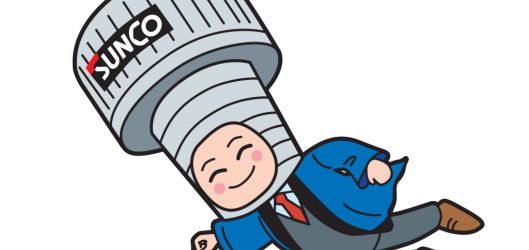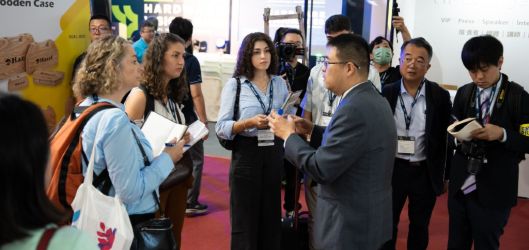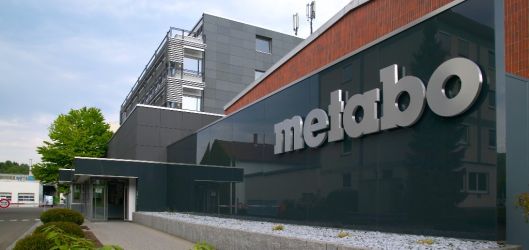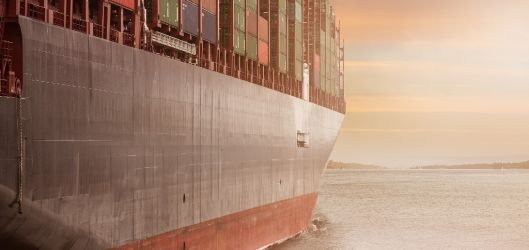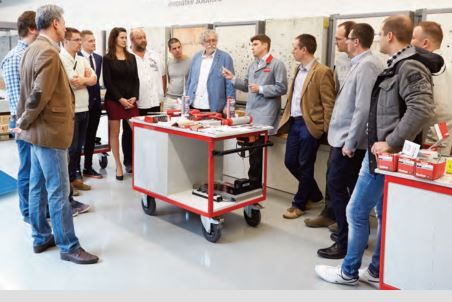
Torque recently accepted an invitation to visit fischer Group’s headquarters in Baden-Württemberg. As well as getting hands-on in the fischer Academy and receiving a full production tour, we spoke to fischer’s Florian Birkenmayer and Johannes Konrad about all things new with the fixings giant...
With a turnover of €876 million in 2019, it’s no surprise fischer Group has become a name recognised in households across the globe for years. Alongside its 47 subsidiaries dotted around the world the Group exports to over 100 countries, and in some boasts an impressive 96% unaided brand awareness.
Upon arriving at the firm’s headquarters in Southern Germany, the Torque team had the opportunity to fully experience the fischer Academy, viewing product demonstrations, new innovations and even attempting to mount some of the anchors.
One of the products on display was fischer’s new Duoblade anchor, its design characterised by a metal tip with three cutting teeth to accelerate and simplify installation. The grey base body made of nylon expends at the appropriate level of single and double plankings. Meanwhile, the red element made of polyethylene reinforces and blocks the expanding func- tion that is further intensified when introducing the screw. Over two and a half years in the making, the Duoblade was chosen out of 5,500 products to receive a Red Dot Design Award three months following its market introduction, rewarding the Research and Development team for their creative and innovative approach.
When we sat down with the Spokesman of the Board of Directors fixing systems, Florian Birkenmayer, and Johannes Konrad, Spokesman of the Board of Directors auto- motive systems, they confirmed there was a huge emphasis on research and development within the company. “We want to maintain and also strengthen our leading position in the market,” explains Konrad. “For that reason, we need to develop our market products and services constantly in terms of safety, quality, innovation and ease of application. This means we need to keep offering a bigger range of products and services to our customers.”
At present fischer’s biggest growth market is Asia, with the firm having had a strong market presence in the region for several years. Naturally, Europe is also an important market for the company, with the United Kingdom making up around 5% of European sales. “Europe in terms of geographical expansion is mostly covered,” Konrad continues. “We have subsidiaries in most countries, and we are very strong with specialised trades, distributors and DIY stores. We also had very good development in the UK last year with double digit growth, and we see good growth in the future especially in projects and products relating to infrastructure, bridges, tunnels and big buildings.”
The company has recently made further investments in its fixing design software and technical service, which is a big area of focus according to Birkenmayer. “We have seven subdivisions in our fixperience soft- ware, which we are planning to bring to the cloud services and use this with our new ecommerce app, which will improve connectivity and allow us to provide more services to our customers,” he says. “Service is always good, and this is very well appreciated. We put on special events and training for craftsman, trading partners as well as planners and structural engineers all over the world and invest in online training, from which we get positive feedback.”
The new ecommerce app, fischer Professional, works in tandem with fischer’s existing fixperience design software and recently received the Digital Champions Award of the German Region Southwest for Best Digital App. Konrad believes the award recognises the hard work of the Digital Services Department in improving the company’s online appeal to customers. “The new app is very much appreciated by customers,” he says. “The customer’s journey is made very simple because they have all the processes of choosing a product, such as materials, applications, indoor or outdoor use, loads and so on. They then get a choice of products and can buy through our trade partners. There is also a direct chat function, with which we’re hoping to integrate video chat in the future.”
The app, which is currently available in Germany, will start to be rolled out to other countries over the next few months, with most European countries able to access it by the end of 2019. Digitisation seems to be high on fischer’s agenda at present. It is an area which is seeing a lot of investment, offers Birkenmayer. “We see the shift towards digital,” he explains. “I think we, especially, are quite ahead in this as we have invested a lot and are happy with the results so far; we want to be not just a fixings provider but a full- service provider.”
Konrad adds: “Digitisation also provides us with the opportunity of targeted marketing, where we can see how many times something has been clicked on and where from. This forms the basis for whatever is to come in the future regarding online, so we are in the place we need to be in.”
The company additionally provides several ecommerce services for its trade partners. “We offer a lot of support for our trade partners through ecommerce services and digital sales channels such as Retail Connect, which enables anyone on our online shop to buy products through dealers with seamless integration,” Konrad continues. “With one click customers can search for products, click and collect or purchase online. We are also doing drop shipment services for our distributors and partners.”
All these approaches fall into line with fischer’s core company values: innovation, self-responsibility, and reliability. The internalisation of Kaizen, a Japanese production philosophy, in the company by Mr Fischer in the late 1990s is also a large part of the firm’s success factors, according to Birkenmayer.
“Kaizen means continuous improvement and avoidance of any sort of waste,” he explains. “This was a big milestone for the company, and elements of this philosophy can be seen in our production processes, and in those of our customers. “It’s the mindset of everybody here, from management to workers, to continually improve our processes, eliminate waste and improve their work. This fits in nicely with our core values, too.”
Originating in Japan, Kaizen has become synonymous with company-wide efforts to improve upon and intelligently streamline business practices, and it’s clear to see this in effect as we tour fischer’s production facilities. On the basis of this, fischer has developed its own fischer processing systems (FPS). Throughout the production hall there are several whiteboards covered in improvements, suggestions and solutions to different production challenges. These improvements come about as a result of groups of employees from different sectors identifying areas of the production process where things could be made better and figuring out ways in which to maximise performance, efficiency and reduce waste.
Each year, several million euros are invested into the company’s headquarters, be it on production facilities, training, buildings and, this year, an innovation campus remodelled from Professor Fischer’s father’s house. Looking to the future, the company is keen to maintain its market presence in Europe and Asia and has a planned expansion in the works for the UK (Brexit permitting, naturally).
Konrad reveals the US is also on fischer’s radar as a focus market for the near future. “It’s a big potential for us,” he explains. “Historically we didn’t go to the US, so we have only started there in recent years. The American market has some specialities, such as imperial measurements, which means a lot of investment in new tools, approvals and so on. But, we have set up a small production area in our automotive plant in the US for our Duopower range, and we are already supply- ing big DIY chains there.”
Being double the size of the US market, Asia will remain the company’s first market priority, although fischer has numerous focuses for the next few years. “Internally, we have four growth fields; product range size and innovation, internationalisation, digitisation and new business models,” he says. “All these channels have several project initiatives. This year, we will focus on our FPS, digitisation and Kaizen philosophy, which is the wish of Professor Fischer and something we truly believe in. If we focus on this, we should hopefully have another good year, like this one.”
